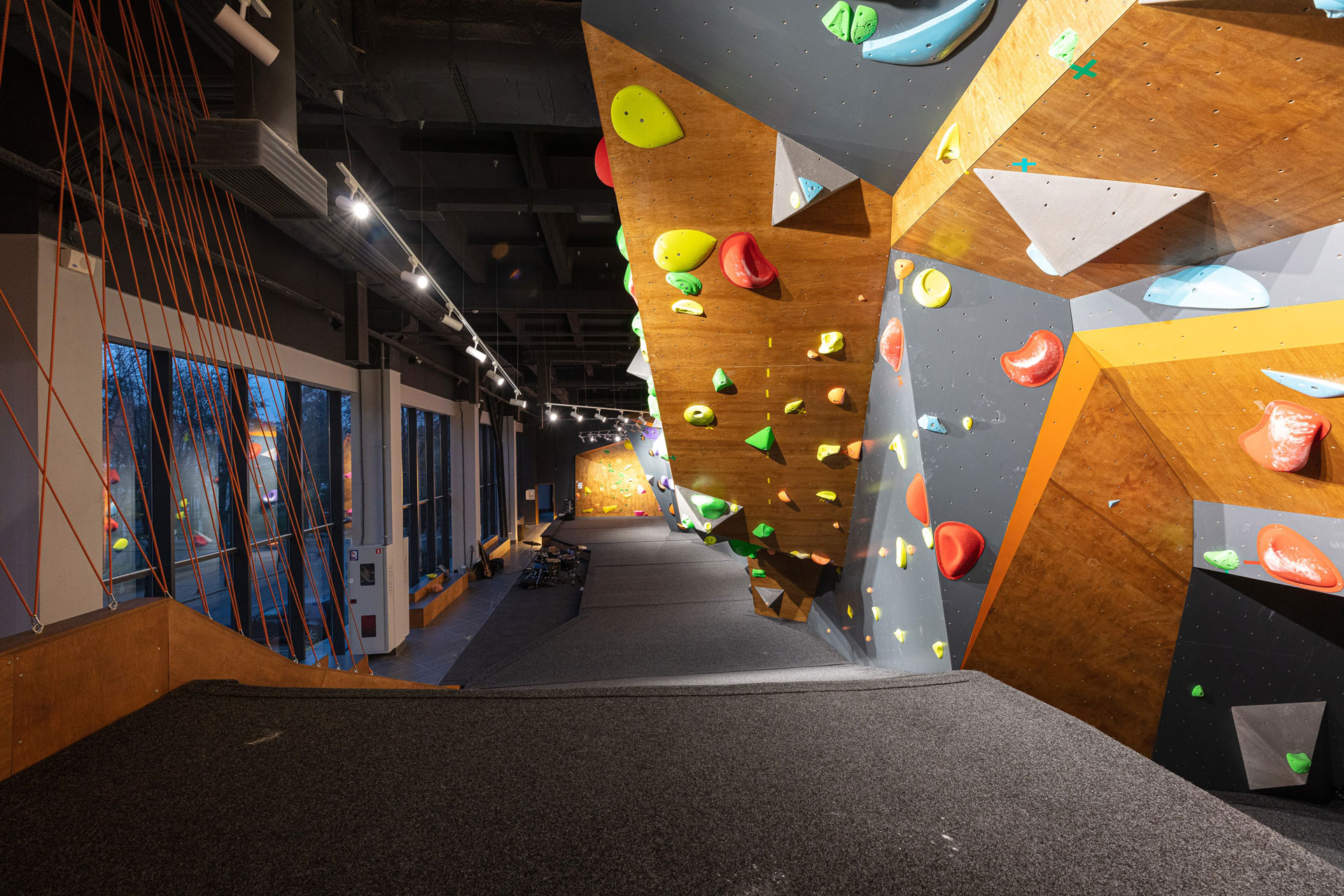
When Stanislav Kleshnov, founder of SPACEGroup in Ukraine, reached out to CBJ to share the business’s story, he discussed the improbability of a phone interview. “Periodically, the enemy attacks the country with rockets, and we have to evacuate to safe places; this can be a hindrance,” he wrote in an email. “The best variant is an interview by letter.” After almost two years of war, these concerns are still part of everyday life for Kleshnov, the SPACEGroup employees, their families, and many other people in Ukraine.
Yet Kleshnov has found it “impossible to sit idly by,” instead choosing to immerse himself in his work. In December 2021, two months before the Russian invasion, SPACEGroup’s third gym, Boulder Space, opened to the public. And in May 2022, just months after the start of the war, TheWall underwent a large expansion during which the gym tripled in size. It’s an expansion story that has been anything but typical, and a journey that has required perseverance and adaptation each step of the way.
From Gym to Shelter
TheWall, a bouldering gym in Lviv, was founded in 2015 by Kleshnov. Four years later, Kleshnov’s childhood friend, Oleg Pokusaiev, founded Climbing Space in Kyiv. As the communities at the gyms grew, Kleshnov and Pokusaiev eventually felt they were at capacity with customers, prompting plans to open Boulder Space and expand TheWall. “In those years, COVID prevailed, but this did not prevent [Pokusaiev] and [Gorobcov] from building a second hall,” Kleshnov says, noting the team “thought more about COVID as a problem” that would impact their businesses than the chance of war.
“We did not believe there would be a war. We hoped that politicians would find a solution to avoid it,” Kleshnov elaborates. “On February 23, 2022, a training session of the Youth National Team was held in Boulder Space. I had conversations with the coaches and talked a little about what could happen, but they still didn’t believe it. On February 24, we woke up in a different reality.”
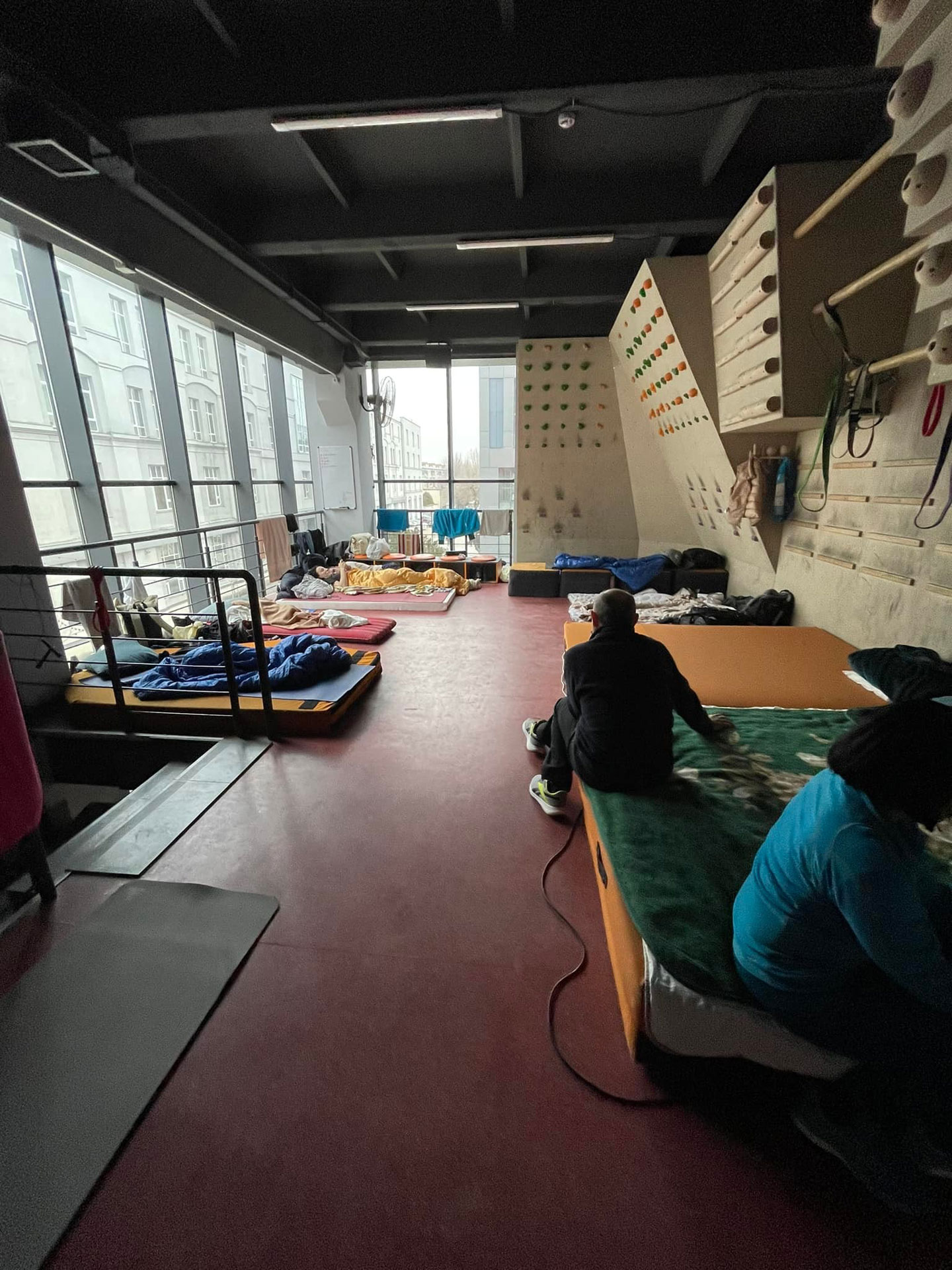
The start of the invasion immediately put SPACEGroup into crisis mode. “At the beginning of the war, we closed all the gyms and evacuated our staff, first to the east to Lviv,” Kleshnov recalls. “On the second day of the war, we took women and children to Europe. Men were already banned from leaving the country at that time.” Met with new demands imposed by the war, TheWall transitioned into a temporary refugee shelter in the early going, subsisting on donations from the world’s climbing community. “We provided regular meals to the refugees and bought everything necessary for their daily life,” Kleshnov says. “Our friends from a nearby restaurant helped: We brought them food, and they cooked for us for the refugees. It was a time of incredible cooperation; everything was done for free, and everyone helped everyone.”
Surprisingly, some climbing was still taking place at the gym—lessons were held for children at the shelter, for instance—but it was far from business as usual. When the war began, “the whole economy stopped,” states Kleshnov, contributing to financial issues for SPACEGroup. TheWall, the only gym to remain open throughout the early months of the invasion, to Kleshnov’s knowledge, operated on a donation basis until the economy started picking up again. “Very quickly,” Kleshnov notes, “our clients let us know that they were ready to pay for our services.”
On the side, Pokusaiev started to create SPACEGroup’s hold brand, 5fingers, while sheltering. “Work is a good distraction from war and stress,” Kleshnov says. “Also, in this way, we started to earn [revenue] and be helpful to the economy of our country. Our business pays taxes; it is very important for us.”
Expanding With Purpose
As the war dragged on, and businesses in the country tried to move forward, Kleshnov began exploring what was next for TheWall. “During the war in your country, every citizen is looking for an opportunity to help your country…We began to think about how to open halls and start working. At this time, everyone who was connected with the military went to the front…and conditions for the functioning of business were created. That is why we decided to take a risk and build a new part of TheWall.”
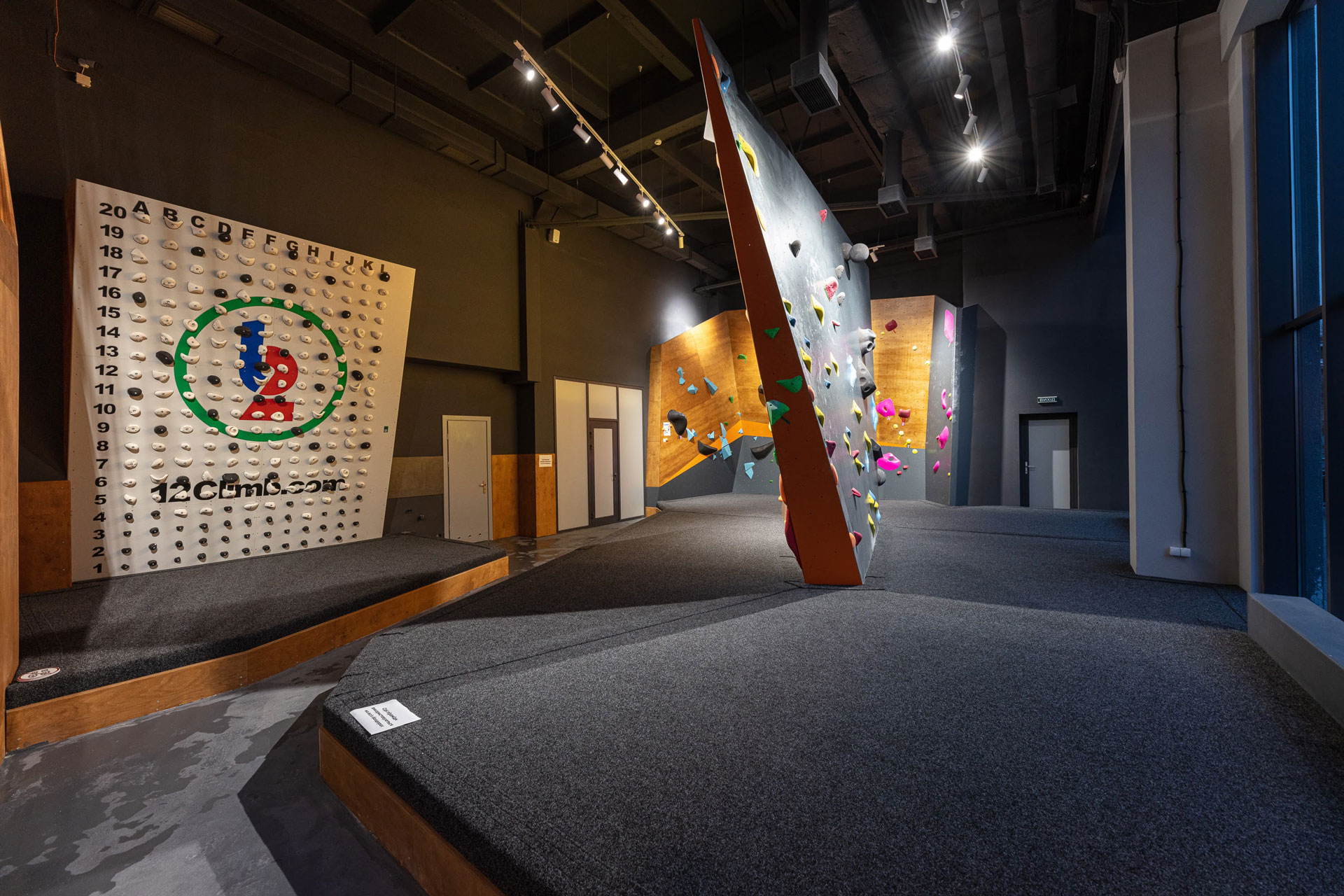
Rather than shrink the scale of the business, Kleshnov sought to enhance the gym’s contribution to the local economy by picking up a previous business objective: increasing the size of the gym. “Plans for expanding the old gym were made a long time ago, but I did not find a favorable model for the [former] main investor. But the war became a trigger and accelerated this process,” Kleshnov explains, with the team wanting to do their part for the economy and provide employment. “[Pokusaiev] and I came to the conclusion that we needed to unite into a single economic network,” a merger that resulted in the formation of SPACEGroup—a business managed by partners Kleshnov, Pokusaiev and Olexander Gorobcov which operates the three gyms and 5fingers. The merger also made TheWall expansion feasible.
“We built all the gyms with our own hands,” Kleshnov says, noting the team dismantled about 100 tons of brick walls to expand TheWall into neighboring squash courts. “We studied the world’s best practices and studied technologies. We can say that we are pioneers of commercial climbing in Ukraine,” he adds. Of course, there were moments of distress during construction. Kleshnov feared further bombardments, for example, would destroy the progress they had made before the addition could be completed.
A New Normal
Today, TheWall has resumed operations as a climbing gym, but the gym has had to adapt as the war evolves. “The enemy attacked the country in different waves. In the very beginning, it was military facilities and airfields. In winter, it was power plants and fuel bases,” says Kleshnov. “That was what reassured us, and we understood that our locations were in safe places. But the enemy often uses old and inaccurate weapons and hits residential buildings, shopping centers, hospitals, schools, universities and others. Therefore, every air alarm paralyzes life in the country.” Blackouts due to power outages, for instance, impacted operations in the early days. “Fortunately, our specialists fixed these problems, and we adapted to the long absence of electricity. We have generators in all our gyms,” Kleshnov says.
Besides these changes, and small pivots for the gyms’ day-to-day operations—such as offering remote services for climbing athletes—“there is no big difference between how we worked before the war and how we’ve worked during it,” Kleshnov assures. “It was very simple. Even before the war, we constantly consulted and helped each other,” sharing knowledge and using similar processes at the gyms. “Of course,” he adds, “during air raids, we turn off the music in the gym, all clients have an alarm app, and there are bomb shelters next to each hall. For us and all visitors, this is already a routine. Most often, actual attacks happen at night, so we work without restrictions during the day.”
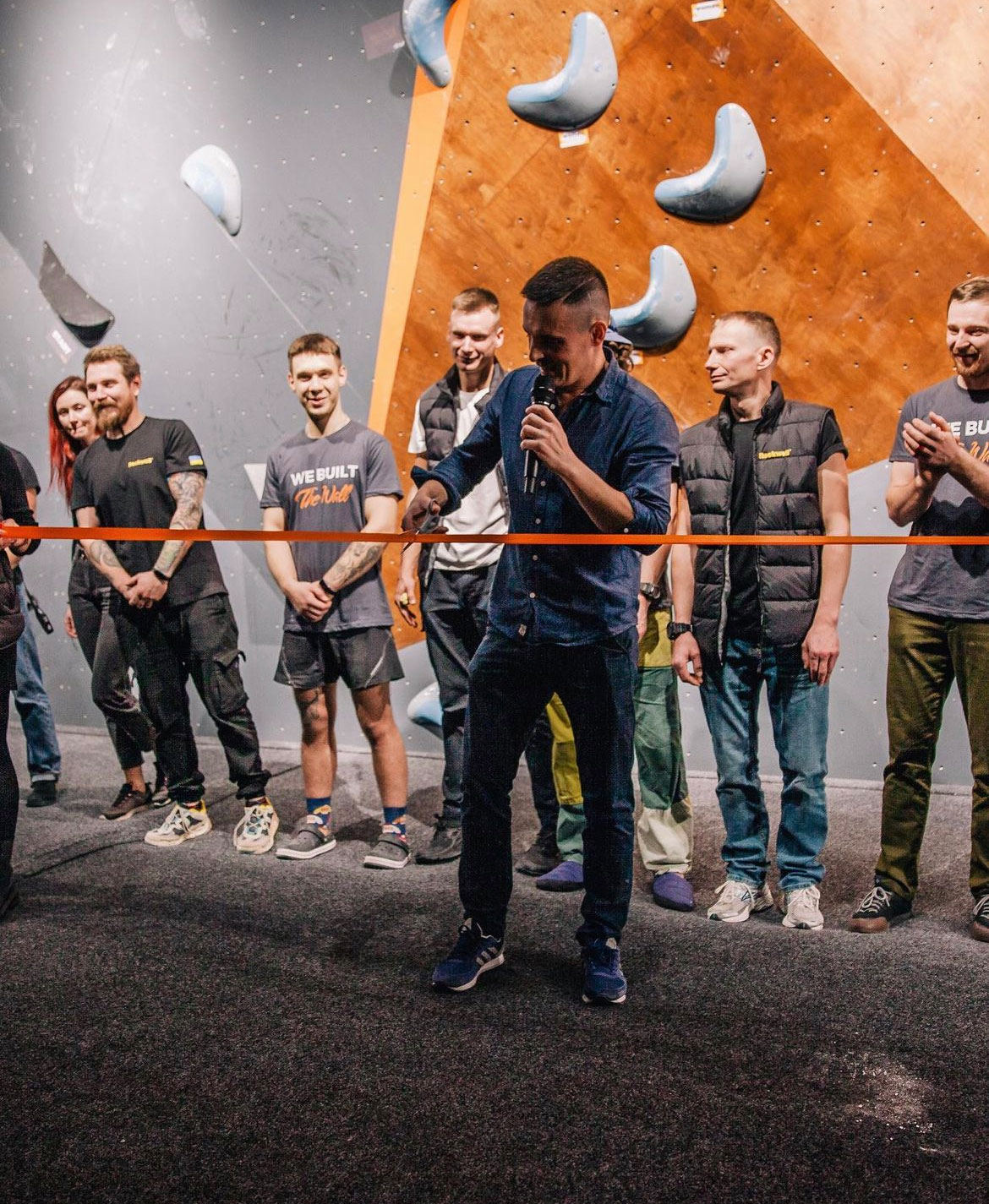
The three gyms are currently open, profitable, and offering membership options, with a team of 45-50 employees across the locations. Kleshnov says that some staff members were able to leave the country, and others were already abroad and did not return. “There are also those who returned and continue to work for us,” he continues. “I have no moral right to condemn those who decided not to return. But our team has a common opinion that this is our country and our home, and we should live here. Ukraine’s climbing community has already lost many incredibly cool people. All of them defended the country. We don’t know how long it will last. The planning horizon is very small, a week—it’s not a joke. The men on our team are at constant risk of being mobilized to the front,” says Kleshnov.
For the team in general, balancing work, family and rest has been a constant challenge. Many staff members volunteer for the war effort in their free time. And some families are still separated, with their children having been evacuated to other European countries. Kleshnov’s children, for example, live in Germany, where they are helped by a community of rock climbers from Freiburg. “I don’t want my boys to return here until the war ends,” he says.
Supporting the Home Team
Since his first days climbing in 1993, Kleshnov has been active in the competition climbing community as a competitor—earning bronze at an IFSC World Cup in 2008 and winning a National Championship in 2015—and National Team coach, in addition to being a business owner. And while his days competing at high-level events may be behind him, that passion has remained part of his work.
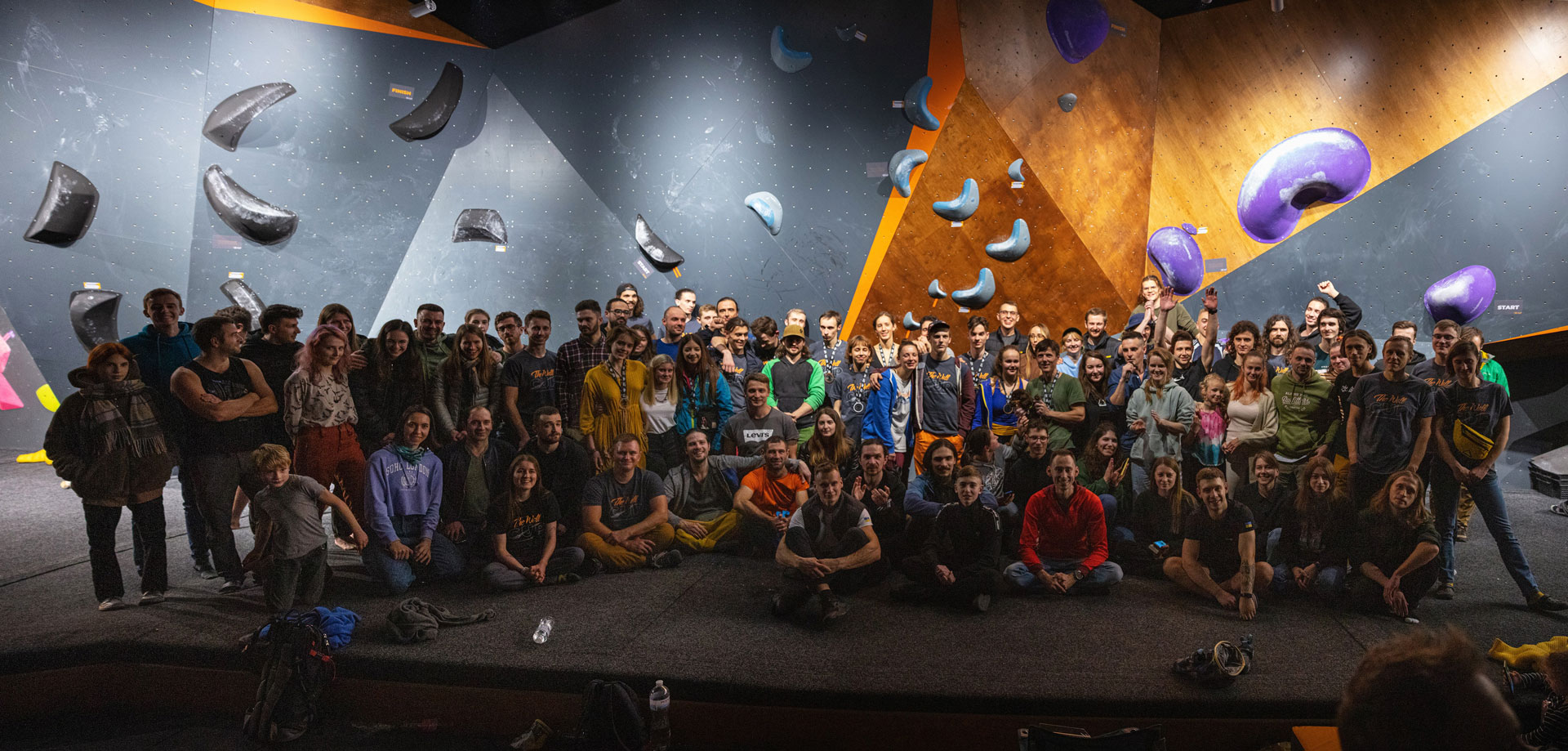
Lately, Kleshnov has been supporting the development of competition climbing in Ukraine as an official of the Ukrainian Mountaineering and Climbing Federation (UMCF) and a representative of the Ukrainian Climbing Development Foundation (UCDF), created by SPACEGroup. The UCDF supports the National Team athletes, as they train and compete on the international circuit, and the UMCF. Funding from the UCDF has provided athletes with uniforms and National Team staff members with financial support, covering their salary and partial expenses of business trips. The fund also provides financial rewards for Ukrainian athletes who win prizes in IFSC competitions, which is no small task: Kleshnov approximated that 27 IFSC medals have been won by Ukrainian athletes this season.
Keeping the comp scene going strong hasn’t been easy. “There is no normal competitive process,” Kleshnov describes. “Many sports bases have been destroyed, logistics have been disrupted, and planes do not fly in our country (only military ones). Therefore, after our victory (we believe in it), the sport will have to start developing from the beginning.” For their part, he and Pokusaiev try to help the UMCF with “plans and new projects, competitions, sponsors, negotiations, prospecting, and the development of new rules and policies.” And of course, Kleshnov adds, “we all climb from time to time.”
How You Can Help
At this stage of the war, Kleshnov urges he does not want donations or special treatment. Instead, he encourages climbers to pay attention to 5fingers, or to donate to the fund for military climbers. He is also interested in getting feedback from other gyms and brands on his climbing facilities and holds. “We independently develop the concept, build the walls, and do not use well-known global manufacturers,” he says. “We founded a factory from scratch to produce our holds in wartime. In the future, we are considering selling our services abroad.” To get in touch with Kleshnov, please reach out to TheWall here.
“Today, our company is a locomotive of close people who have been together throughout our lives, and we were united by rock climbing. Partners are friends, friends are my clients and students in the past,” says Kleshnov, expressing his gratitude for everyone with whom he has “crossed paths for the development of this industry” in his country. Mainly, he wants readers to know: “Ukraine aspires to be free and part of the civilized world.”
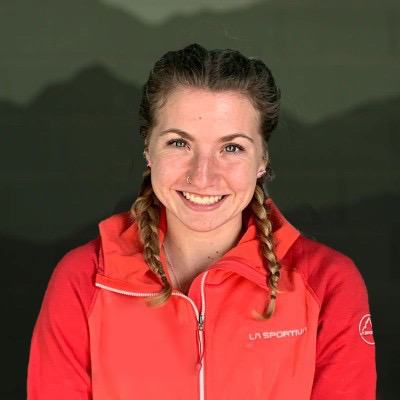
Naomi is a personal trainer and a routesetter who has also worked at climbing gyms as a youth team coach. After starting college at Colorado State University in 2017, she wanted to make new friends and found climbing, fell in love, and now climbing dictates most of what she does. Naomi earned a bachelor’s degree in Ecosystem Science & Sustainability, and when not climbing she enjoys baking, gardening and crafting.










